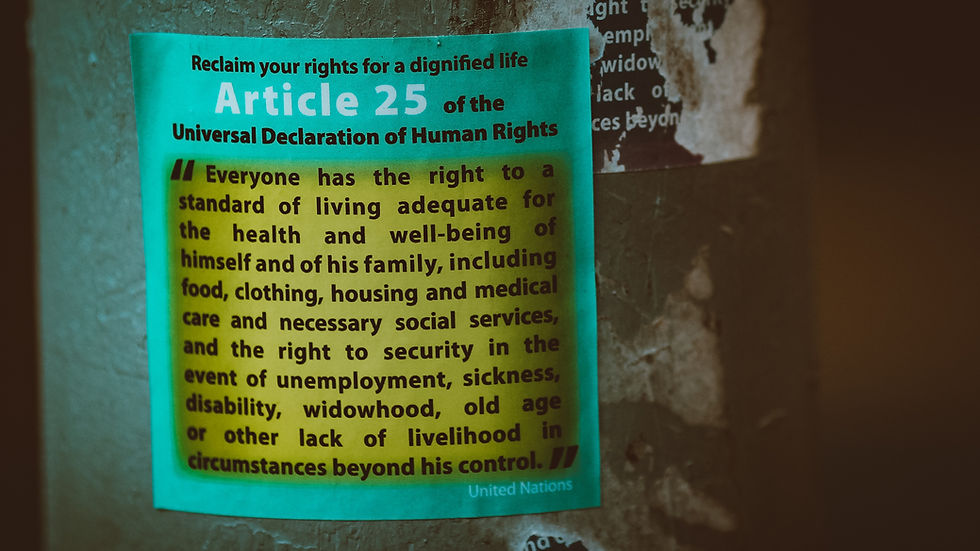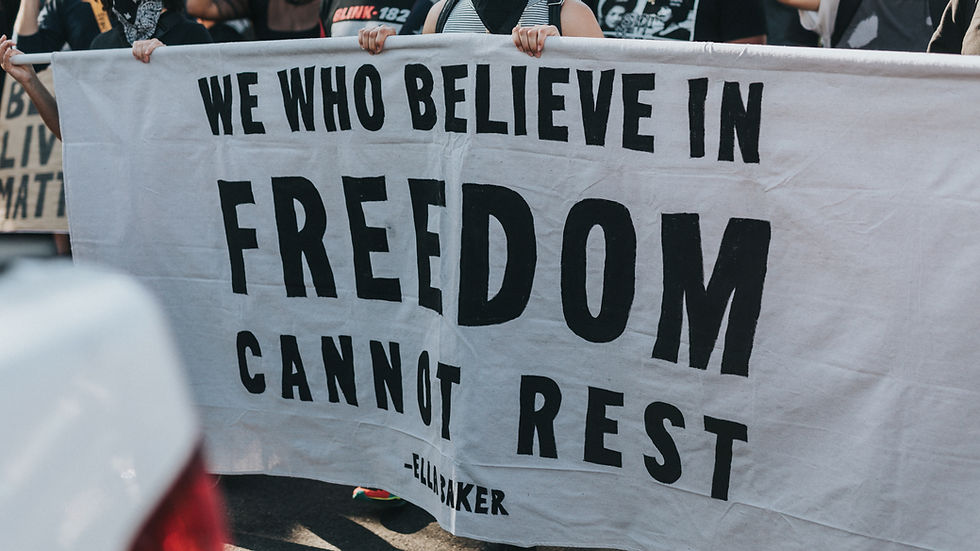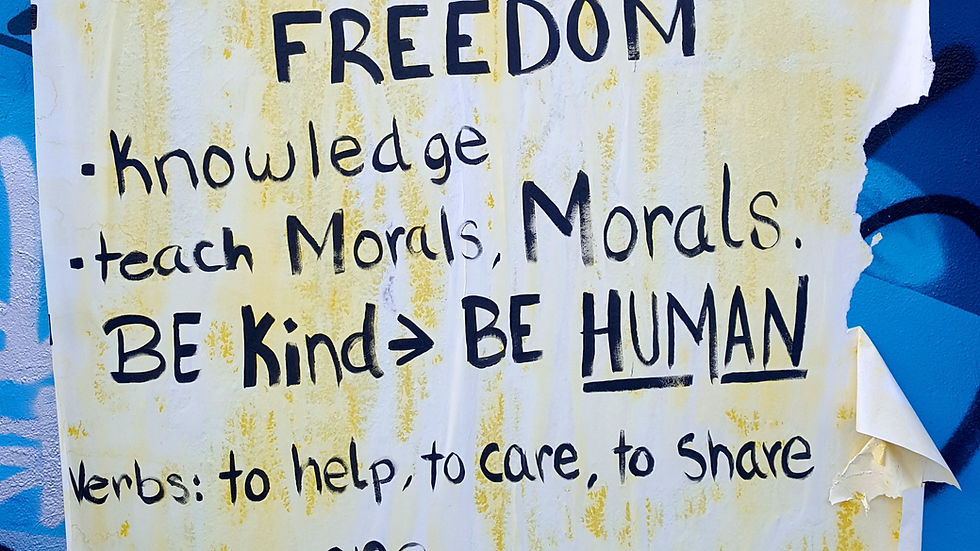Women's Wombs Under Attack: Understanding Reproductive Justice
- blackactivistwriter
- Jul 31, 2025
- 6 min read
Updated: Sep 22, 2025
I. What is Reproductive Justice (RJ)?
Reproductive justice (RJ) is a human rights framework. It emphasizes that Black women, girls, and gender-expansive individuals have the autonomy to make sound sexual and reproductive health decisions for themselves and their loved ones.
The RJ framework is anchored in four central tenets:
The right for individuals to have children.
The right to NOT have children.
The right to access social and economic support to raise living children.
The right to be free from and protected against myriad forms of violence and discrimination.
These tenets align with similar human rights aspirations enshrined in global standards. RJ is grounded in the principles of gender equality and human rights. The Universal Declaration of Human Rights (UDHR) provides a foundational blueprint for global equality, dignity, and world peace.

II. What is my "why" for writing about this topic?
Reproductive justice is a subject that is near and dear to my heart. Black mothers deserve the right to live healthy lives and to raise their children in safe environments. The fact that these ideals are not a living reality in our nation makes me feel disheartened.
Black women are the engine that fuels society. We are the backbone of our households and contribute significantly to the workforce. Black women are resilient, innovative, and a force to be reckoned with. However, there is a stark contrast between America's esteemed values of liberty and equality and the lived realities of Black women.
At every waking moment, we endure microaggressions, systemic racism, and institutional neglect. This is the driving force behind my purpose to use my platform to amplify Black women's experiences and raise awareness of the maternal health disparities we continue to face.

III. How has gender inequality shaped our political landscape?
The anti-gender movement has surged since the 1990s. Journalist Dale O'Leary introduced the term "gender ideology" in her book The Gender Agenda (1997). Since then, this term has entered mainstream discourse, often used to discredit ideas and movements that promote gender equality and human rights. At its core, the anti-gender movement seeks to undermine fundamental human rights. This movement includes the rights to expression, assembly, protest, and bodily autonomy.
A stark example of this decline is the 2022 overturning of Roe v. Wade, which guaranteed the constitutional right to abortion in the United States. Reproductive rights are just one piece of the puzzle. Proponents of the anti-gender ideology also employ various tactics, such as promoting right-leaning ideologies and pushing for rigid heteronormative norms. One common narrative is that a woman's place is at home, raising children. Another belief is that the nuclear family is the only acceptable model of family life in modern American society.
The criminalization of abortion and the rise of other draconian laws further illustrate how gender inequality continues to influence our cultural and political institutions. These methods have eroded democratic values through fear-mongering and the dissemination of disinformation.
In authoritarian regimes, such as Russia, it is illegal to protest against injustices or inform the public about social issues. Such oppressive restrictions silence activists and deter people from advocating for equality and human rights.

We are living in deeply uncertain times. The world is burning—literally and figuratively—with no end in sight. We are entrenched in fear, anger, division, and hate. Black women, as always, are on the frontlines, bearing the brunt of these socio-political crises. At times, freedom feels elusive amid continuous patterns of conflict, struggle, and suffering.
IV. How does the threat of reproductive justice impact Black women?
The threat to reproductive justice impacts Black women across two key areas: health equity and economic justice. Many people fail to realize that reproductive justice is not merely an individual issue; it is deeply rooted in social equity. The Trump Administration's repressive laws and policies are projected to harm Black women on a larger scale.
From a health perspective, abortion access remains a hotly contested topic. As of this year, abortion is banned or severely restricted in approximately 26 U.S. states, according to the National Partnership for Women and Children, a nonpartisan, national nonprofit organization. According to In Our Own Voice: National Black Women's Reproductive Justice Agenda, a reproductive justice-centered organization, 57% of Black women live in states like Georgia, Texas, and Florida, which have stringent abortion laws.
Another target of Project 2025 is reproductive health, particularly pregnancy care, which is directly linked to the defunding of essential social programs like Medicaid.

a. Wombs under Attack: Health disparities
To understand the colossal impacts of these cuts, we must consider the adverse health outcomes already stacked against Black women. According to the CDC, Black women are two to three times more likely to die from childbirth and other pregnancy complications than White mothers. But it doesn't stop there. Black babies are also highly susceptible to being born prematurely, which increases the risk of infant mortality.
Black women often have limited or no access to high-quality healthcare due to broader challenges, such as inadequate health coverage, low income, limited transportation, and geographic barriers. For example, Black women are 40% more likely to die from breast cancer than White women. Furthermore, they are more likely to be diagnosed at later, more aggressive stages of the disease when treatment options are limited and survival rates are low.
The fact is that Black women are living in a deeply entrenched racist society where we are constantly undermined, unvalued, and misunderstood. What makes this maternal health crisis so unfortunate is that it is 100% preventable.

b. Wombs under Attack: Economic Policy and Medicaid
The threatened loss of Medicaid funding is already impacting the most vulnerable populations. President Donald Trump recently enacted the "One Big, Beautiful Bill Act," a law that seeks to destroy the fabric of our nation under the guise of beauty. Despite its benign name, there is nothing beautiful about legislation designed to decimate essential safety net programs. Its underlying purpose is to widen the wealth gap, boosting the power and wealth of the elite while pushing poor and working-class Americans further to the margins.
According to In Our Own Voice's 2025 Policy Agenda, 51% of Medicaid recipients are women of color. I can personally attest to the importance of this program. Medicaid has been, and continues to be, a vital lifeline for me, especially during this current period of job loss. I'm grateful for the healthcare access it has provided during an incredibly trying chapter of my life.
Medicaid, along with the Supplemental Nutrition Assistance Program (SNAP) and other public support programs, sustains innumerable Black households. According to In Our Own Voice, Medicaid provides coverage for about two-thirds (66%) of Black births, compared to a national average of around 42%. Medicaid also provides coverage for about one-third of Black women. These statistics underscore its invaluable role in reproductive healthcare.
Abortion access is inextricably linked to Medicaid. The One Big, Beautiful Bill Act sought to strip Planned Parenthood and its affiliates of Medicaid funding. However, U.S. District Judge Indira Talwani issued an injunction against that provision, ruling it unconstitutional and a punitive measure against Planned Parenthood clinics that provide abortion services.

The implications of this temporary injunction are vast. If Planned Parenthood clinics ultimately lose Medicaid funding, it would significantly hinder patients' access to timely sexual and reproductive healthcare. The outcomes are dire. Individuals may turn to unsafe, back-alley abortions or be forced to carry unwanted pregnancies to term due to a shortage of viable care options.
V. Conclusion
As I have stated at the beginning, Black women's wombs are under attack due to systemic racism and the Trump Administration's rollback on diversity initiatives and defunding of programs like Medicaid. These bans will affect Black communities and their finances in the long run. I emphasize that these cuts are not just a political issue; they are an existential threat. The fight for reproductive justice is ongoing. Black women deserve to thrive, not just merely survive. We deserve to experience joy, laughter, and freedom from the shackles of misogynoir and systemic racism.
VI. Call to Action
I want to stress that reproductive justice is not just a political issue. It is a human rights plight that affects the dignity, health, and well-being of Black women. If this blog post resonated with you, here are a few meaningful ways to take action:
Share this post widely.
Help spread awareness by sharing it on all of your social media platforms. Tag people, use hashtags like #ReproductiveJustice and #HonorBlackWomen, and invite others into meaningful discussions.
Support reproductive justice-centered organizations.
Follow and donate to organizations such as the National Partnership for Women and Families and Black Mamas Alliance. These organizations, among many others, are tirelessly working to achieve reproductive justice for all.
Learn about, respect, and honor Black women's voices.
Understanding and valuing Black women's voices—and creating safe, intentional spaces for them to share their wisdom—would be a crucial starting point. This approach helps us reconcile and heal from past and present wrongs inflicted upon Black women daily.
Remember, talk is cheap. Respecting and honoring Black women's voices should be reflected in our actions! It must be self-conscious and intentional.






Comments